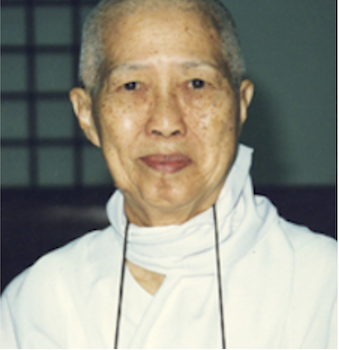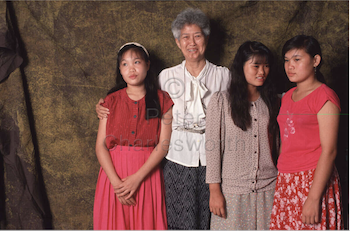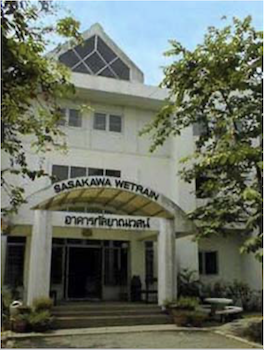
Khunying Kanitha Wichiencharoen was a women's rights activist and lawyer who later on became a Mae Chee (female monastic in Thailand), which means “respected mother” as an honorary title for the Buddhist nuns. To this day, she is honored and recognised as a pioneer of women’s rights advocacy in Thailand, having fought tooth and nail for the women in her country.
Born on the 4th of November in 1922 in Bangkok, Kanitha was one of the two daughters of Thanom and Mangorn Samsen. While her mother stayed home, her father was a well-known lawyer of his time, serving as a senator during the country’s transition to a constitutional monarchy. Raised in the heart of the city, she attended the schools of St. Francis Xavier and St. Yoseph Convent. Her parents had always prioritized her and her sister’s education, so she was well-supported throughout her educational journey. Following in her father’s footsteps, she enrolled in law school. Upon graduating from Thammasat University in 1945, for the next two years, she worked as a counselor with women who had suffered from abuse and discrimination. After this, in 1948, Samsen continued her education in the United States, studying international law at American University and Columbia University. As a seemingly final note to her further studies, she took up international relations at the Graduate Institute of International and Development Studies in Switzerland in 1949. Amidst her work, Wichiencharoen studied social welfare at Howard University, returning to the States again in 1953. In 1950, at 28 years old, she married Adul Wichiencharoen, who she would end up having three kids with. They remained married till death.
Wichiencharoen’s career officially began when she worked at the Ministry of Foreign Affairs, where she first met her husband.Following her further studies in social welfare, she was employed as a supervisor at the Standard Vacuum Oil Company, returning to her home country. Other advances in her career included her work for the USAID (United States Agency for International Development) and her work in the Tourist Authority as a legal advisor. In 1963, Wichiencharoen became the executive secretary of the Thai-American Technical Cooperation Association, maintaining that position for the next 21 years. Moreover, she also acted as a legal counselor to several organizations such as developmental NGOs, companies in the petroleum industry, and most notably, the United Nations.
In addition to her outstanding achievements in the workplace that served as a reminder that women were equally capable in their studies and work, Wichiencharoen is also known for advocating for and protecting women from discrimination and exploitation. In 1961, she took the mantle of president of the Women Lawyers’ Association of Thailand. Throughout her 3-year term, she traveled frequently for her duties and throughout this time period, she visited women’s shelters to implement new ways to improve the services provided for women who needed them at the time. For example, she met up with directors of local welfare agencies to learn how to establish their programs in women’s rights. At the same time, she hosted Saturday workshops for female lawyers to give pro bono legal advice to the public. Eight years later, Kanitha Wichiencharoen was elected president of the International Women’s Association of Thailand.

Throughout the 1970s, Wichiencharoen was actively involved in the Thai women’s rights movement, leading many to even say that she led the movement. In 1974, Wichiencharoen founded the Association for the Promotion of the Status of Women (APSW) with its mission to create an equitable and inclusive society by empowering women; the non-profit organization started a campaign to revise the existing laws to better protect women and children in Thailand. As both founder and president of APSW, she soon became chair of the National Council of Women’s standing committee on Women and Labour. In the meantime, she continued to study the situations of women worldwide to an in-depth extent. To do so, she participated in global conferences, academic experiences, and observations at women’s shelters and rape crisis centres overseas; this went on for over 27 years, from a 1961 study of the family and youth court in Japan to a 1988 lecture at the Nordic forum and Swedish Women’s Association. While fighting for amendments to protection laws, Wichiencharoen opened her home as an emergency shelter to assist the abused, unemployed, and elderly women due to the lack of such resources in Thailand; hence, the authorities would refer endangered women to her.
Furthermore, Wichiencharoen continued her efforts in various areas: housing, education, and health. In 1980, Wichiencharoen began a funding drive, where all proceeds would go towards establishing a permanent women’s shelter. She managed to raise ฿50,000 (equivalent to $2000 USD), allowing APSW to set up the first women’s shelter in Thailand – the Emergency Home and Relief Fund for Women and Children in Distress – providing housing, meals, and medical referrals. The shelter overflowed with women and children as soon as it opened. Within six years, the original space was no longer sufficient. Thus, Wichiencharoen and APSW opened two more shelters in Bangkok.
Aside from that, Wichiencharoen also raised funds to open an educational facility, the Women’s Education and Training Centre (WE-TRAIN), to provide academic and vocational training for women. The vocational training was tailored to the women’s interests, allowing women to gain skills to generate income in the future. The center also collaborated with the Ministry of Education to provide non-formal education. At the same time, they coordinated with local schools nearby to arrange schooling for children who lived in their shelters.
In terms of supporting women's health, Wichiencharoen developed a clinic dedicated to assisting and caring for pregnant women. With the contribution of 1 million Baht from former U.S. President Jimmy Carter and his wife, Rosalynn Carter, the Jimmy-Rosalynn Carter Women’s Clinic and Nursery was established. Specifically, it catered to mothers, newborns, and unplanned pregnancies. Through her work in building shelters and accommodating basic needs, Wichiencharoen helped over 44,000 women and children who were victims of rape and abuse.

Regarding her work in law and policy, Wichiencharoen also founded a policy research center focused on analyzing socio-economic and political issues affecting women. The center, Gender and Development Research Institute (GDRI), later qualified as an NGO (non-governmental organization) working to improve the welfare of women in the social class. In addition, she began an Information Booth Project, setting up booths near Bangkok’s main train and bus stations. Each booth provided information about job opportunities and exploitation traps as it aimed to prevent rural migrant women from being lured into forced labor and prostitution. The project was extended to include more routes, and at least one social worker and a lawyer present. Going on for five months, the project was able to service 848 cases.
Wichiencharoen was also loyal to her Buddhist faith, yet the apparent disparities between men and women in Buddhism did not go unnoticed. While she became ordained as a maechee (“lay nun”) in 1993 as Maechee Khunying Kanitha, she remained involved in APSW and its work. Through social work, she aimed to improve the nuns’ low status in society by campaigning for their education and legislative status. For example, she lobbied for the passage of the Nun’s Bill of Rights, which aimed for women in religious orders to have political autonomy protected by law. The bill also gave women in religion sole authority to allocate their funding as well as determine the ordination of members. Unfortunately, the bill was rejected due to a few loopholes, which have since been refined. Nevertheless, Wichiencharoen still worked to improve the perception and opportunities of nuns. She advocated for nuns, who she believed needed access to higher education. During her struggles with cancer, she founded the first college – Mahapajapati Theri College – for women to gain a bachelor of arts degree in Buddhism and philosophy, collaborating with APSW and Thai Nun’s Institute. For its first three years of operation, the college teachings took place in the APSW facilities before it was granted a campus.
On May 13, 2002, Maechee Khunying Kanitha Wichiencharoen passed away after a long battle with cancer. Even during her struggles, she did not stop protecting and fighting for the women in Thailand. She was honored as an outstanding advocate for women during International Women’s Day festivities and received an honorary doctorate in Philosophy, Sociology, and Anthropology. After death, her legacy lives on. Today, she is a recipient of the Outstanding Women in Buddhism Award, which pays homage to the courage she has shown in her life. Her organizations continue her efforts, establishing rape crisis centres and youth centres. She was a woman who protected other women – saving over 60000 women throughout her life – and she will not be forgotten.
Why Did I Choose to Research Khunying Kanitha Wichiencharoen?
As someone living in Malaysia, I have always wanted to learn about the history of our ASEAN countries; most of the time, women leaders are rarely recognized and honored in our textbooks, articles, and studies. I wanted to research Kanitha Wichiencharoen because she is the epitome of the principles of courage, determination, and effort. With most of our rights and women’s history being returned to us not long ago, I think it is worth researching one of the women who fought for those same rights we have today.
Works Cited
Helle Rydstrøm. (2010). Gendered Inequalities in Asia. NIAS Press.
International Women’s Meditation Center Foundation. (n.d.). Iwmcf.net. Retrieved May 1, 2024, from https://iwmcf.net/awards
Monica Lindberg Falk. (2007). Making Fields of Merit. NIAS Press.
Shashi Ranjan Pandey, Darunee Tantiwiramanond, “By Women, For Women: A Study of Five Women's Organizations in Thailand” University of Wisconsin (1991) Research notes and discussions paper, Institute of Southeast Asian Studies; no. 72. 1. https://dokumen.pub/by-women-for-women-a-study-of-five-womens-organizations-in-thailand-9789814376273.html
Tsomo, Karma Lekshe PhD, "Out of the Shadows: Socially Engaged Buddhist Women" (2019). Theology and Religious Studies: Faculty Scholarship. 25. https://digital.sandiego.edu/cgi/viewcontent.cgi?article=1024&context=thrs-faculty
This article was published on 6/12/24